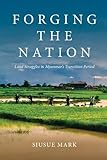Forging the Nation : Land Struggles in Myanmar’s Transition Period / SiuSue Mark.
Material type: TextPublisher: Honolulu : University of Hawaii Press, [2023]Copyright date: ©2023Description: 1 online resource (280 p.) : 7 b&w illustrationsContent type:
TextPublisher: Honolulu : University of Hawaii Press, [2023]Copyright date: ©2023Description: 1 online resource (280 p.) : 7 b&w illustrationsContent type: - 9780824895327
- 333.709591 23/eng/20221205
- HD860.7.Z63
- HD860.7.Z63 M36 2023
- online - DeGruyter
| Item type | Current library | Call number | URL | Status | Notes | Barcode | |
|---|---|---|---|---|---|---|---|
 eBook
eBook
|
Biblioteca "Angelicum" Pont. Univ. S.Tommaso d'Aquino Nuvola online | online - DeGruyter (Browse shelf(Opens below)) | Online access | Not for loan (Accesso limitato) | Accesso per gli utenti autorizzati / Access for authorized users | (dgr)9780824895327 |
Frontmatter -- Contents -- Illustrations and Tables -- Preface -- Acknowledgments -- Abbreviations -- Introduction -- CHAPTER ONE The Context for Land Tenure Reform -- CHAPTER TWO The State’s Quest for Legitimacy Opens Space -- CHAPTER THREE The Ethnic Politics of Land -- CHAPTER FOUR New Market Incentives Shape Norms -- CHAPTER FIVE Ayeyarwady Region State-Citizen Negotiations -- CHAPTER SIX Chin State Between State and Customary Institutions -- CHAPTER SEVEN Kayin State or Kawthoolei Dual Administration -- Conclusion -- Notes -- References -- Index -- About the Author
restricted access online access with authorization star
http://purl.org/coar/access_right/c_16ec
On February 1, 2021, Myanmar was thrown into a state of crisis by a military coup, abruptly ending a decade of civilian rule. The junta imprisoned the political opposition and deployed lethal force to quell dissent, thinking that most people would meekly acquiesce. However, they underestimated the tenacity of the nascent democracy that had taken root in the last decade. Instead, a civil disobedience movement quickly emerged, with people going on strike across the country to prevent the junta from exerting control, which was soon followed by armed struggle among urban youth. Forging the Nation: Land Struggles in Myanmar’s Transition Period examines how democratic institutions were fought over and built from 2011 to 2020 through the lens of land politics. This book explains how the differences in outcomes in the contest over land are situated in the specific historic and political contexts of Myanmar’s states and regions, despite them being subject to the same national dynamics.As Myanmar is an agriculture-based economy involving two-thirds of the population, land remains a coveted asset in the era of the “global land rush,” referring to the intensification of capital’s pursuit of land since the food price surges in 2008–2009. Thus, land is also the ideal lens through which to understand the dynamics of a country that underwent a three-part transition: toward democracy, toward peace with a national ceasefire, and toward open markets after the lifting of sanctions by the West. Against a fraught democratization process that unfolded from 2011 to 2020, Forging the Nation looks at how state and societal actors in Myanmar’s multiethnic society, recovering from over seven decades of civil war, negotiated land politics to shape democratic land institutions. By exploring the interaction of the democratic transition, ethnic politics, and global capital pressures on land across national, regional, and local scales, Siusue Mark provides an overarching frame pulling together these three facets that are usually treated separately in the literature. Emphasizing the co-constituent relationship between democratization and land politics, Forging the Nation makes a unique contribution to understanding the role of land in political-economic transitions.The views expressed in this book are solely those of the author and not necessarily those of any affiliated institution.
Mode of access: Internet via World Wide Web.
In English.
Description based on online resource; title from PDF title page (publisher's Web site, viewed 06. Mrz 2024)


